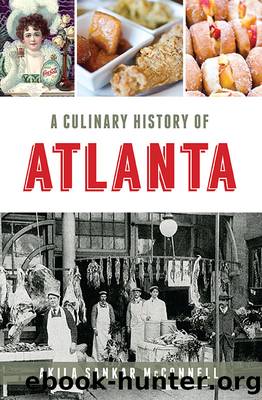A Culinary History of Atlanta by Akila Sankar McConnell

Author:Akila Sankar McConnell
Language: eng
Format: epub
Publisher: Arcadia Publishing
Published: 2019-01-15T00:00:00+00:00
IN 1895, THE AFRICAN American community in Atlanta buzzed as it planned for the opening of the Negro Building at the Cotton States and International Exposition, the black communityâs first attempt to showcase its achievements since the end of the Civil War. The exposition was Atlantaâs largest yet, and concerned about how Atlantaâs five main restaurant owners could feed the twelve thousand guests per day, the newspaper reported facetiously that an enterprising individual could make a fortune by establishing a âpatent sandwich nickel-in-the-slot machine,â what the modern American would call a vending machine.
By September, Atlanta was finally ready to welcome 800,000 guests over a three-month period. President Grover Cleveland flipped an electric switch from his home in Massachusetts, turning on the lights at the exposition in Atlanta, and the citizenry rushed in, eager to ride the Phoenix Wheel and the Scenic Railway and see the Liberty Bell shipped in from Philadelphia. And, on that day, Booker T. Washington gave a speech that resonated across the country and sealed the Atlanta Exposition as one of the most important in history.
Booker T. Washington was born into slavery in Virginia and spent his early childhood living with his mother, the plantation cook, in a one-room, dirty cabin that served as the cookhouse for the plantation. Hunger was chief among Washingtonâs childhood memories. One afternoon, during the Civil War, he was summoned to fan his two young mistresses as they shared a snack of ginger cakes, which seemed to be the âmost tempting and desirable things that I had ever seen,â and he âthen and there resolved that, if I ever got free, the height of my ambition would be reached if I could get to the point where I could secure and eat ginger cakes in the way that I saw those ladies doing.â158
After painstakingly making money working at salt furnaces and coal mines, Washington attended Hampton Institute and Wayland Seminary and was then offered the job as the president of the newly formed Tuskegee Institute at age twenty-five. The institute began with literally nothing, meaning that the students had to dig their own kitchen and dining room, and the students cooked all of the meals and grew their own food. Washington focused the institute on an industrial and technical education, under the idea that upward mobility and the rise of the African American race would occur when black youths mastered industrial and technical skillsets.
At the exposition, Washington presented this âAtlanta Compromise,â espousing those views, refusing to challenge segregation and disenfranchisement. Instead, he urged blacks to âcast down your buckets where you areâ and make progress as laborers. He stated that the âwisest among my race understand that the agitation of questions of social equality is the extremest folly.â The white audience loved the speech, with newspapers proclaiming it as the best type of sense.
It was a strange moment in Atlantaâs culinary history. At Piedmont Park, the Negro Building showcased black achievements to an integrated audience while, at the opening ceremony, a black
Download
This site does not store any files on its server. We only index and link to content provided by other sites. Please contact the content providers to delete copyright contents if any and email us, we'll remove relevant links or contents immediately.
Kathy Andrews Collection by Kathy Andrews(11812)
The remains of the day by Kazuo Ishiguro(8969)
Paper Towns by Green John(5175)
Spare by Prince Harry The Duke of Sussex(5174)
The Body: A Guide for Occupants by Bill Bryson(5079)
Industrial Automation from Scratch: A hands-on guide to using sensors, actuators, PLCs, HMIs, and SCADA to automate industrial processes by Olushola Akande(5046)
Machine Learning at Scale with H2O by Gregory Keys | David Whiting(4292)
Be in a Treehouse by Pete Nelson(4032)
Never by Ken Follett(3935)
Harry Potter and the Goblet Of Fire by J.K. Rowling(3848)
Goodbye Paradise(3798)
The Remains of the Day by Kazuo Ishiguro(3390)
Into Thin Air by Jon Krakauer(3384)
Fairy Tale by Stephen King(3369)
The Cellar by Natasha Preston(3333)
The Genius of Japanese Carpentry by Azby Brown(3286)
120 Days of Sodom by Marquis de Sade(3261)
Reminders of Him: A Novel by Colleen Hoover(3088)
The Man Who Died Twice by Richard Osman(3070)
